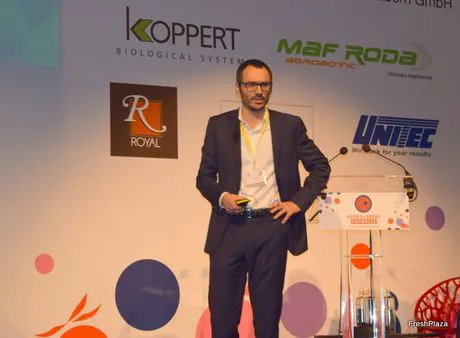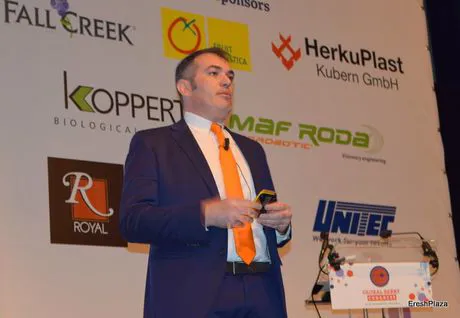Flavour and quality were the key words of the Global Berry Congress, held in Rotterdam yesterday. During the various sessions, a remarkable amount of attention was paid to consumers and their changing behaviours. It wasn’t surprising that terms such as flavour and quality were often mentioned, although the two words were in danger of losing their meaning the more they were repeated.
Alongside the figures about changing consumption patterns, the question ‘How can we sell more soft fruit?’ was also contemplated towards the end of the morning. Ben Maes from Special Fruit talked about the Berry Fresh label. The brand name has been around a while, but according to Ben, sales have increased by 70 per cent since 2013. The increase had to do with the company's main focus: year-round supply, a network of permanent growers and own production. To increase consumption, it is important to reach consumers before they visit the supermarket, while the customer walks through the supermarket, and after the product has been purchased.
One of the companies that Special Fruit works with is the Portuguese BFruit. This company was founded in 2013 and consists of a group of soft fruit growers. In total, they grow on 10 hectares of blackberries, 100 hectares of raspberries, 75 hectares of blueberries and 14 hectares of red currants. “Portugal is the only European country with the advantage of the Atlantic Breeze, resulting in a longer season,” says Pedro Bragança. Alongside that, the fruit develops more slowly than in other regions, resulting in better flavour and colour of the fruit, according to the Portuguese.
 Pedro Bragança, BFruit.
Pedro Bragança, BFruit. At the small fair square, where about twenty companies presented themselves, it was remarkable how well-represented the suppliers were. While the lectures were mostly about consumption, marketing and sales, these companies focused more on steps earlier in the supply chain. Attention was especially focused on the beginning of the supply chain, improvement and cultivation. The responses among exhibitors were varied. The congress hardly draws technical people and growers, who are the target audience for these companies. However, it is positive that the people visiting the congress eventually make decisions, according to one exhibitor.
 Raffaele Benedetti, Unitec.
Raffaele Benedetti, Unitec. After the break, more attention was paid to the quality of the berries after harvesting. Unitec and BBC Technologies talked about the influence of a good sorting. Raffaele Benedetti predicts a similar shift as in cherries, for which optical sorting has become standard by now. A Chinese customer of the Italian machine builder says that sales increased by about 20 to 30 per cent thanks to good sorting. Geoff Furniss, CEO of BBC Technologies, adds that technique improves the consumer experience. A good consumer experience results in a repeat purchase more quickly, and therefore causes an increase in the sector, according to the New Zealander.

Geoff Furniss, BBC Technologies.
Ekland Marketing used the congress to introduce new members of the board. The soft fruit specialist appointed Patrick Ballew as CEO. Rodrigo Ocampo takes over the position of CFO, and Gabriala Pavia also becomes a member of the board.
Click here to view the photo report.





